Breaking Democracy's Glass Ceiling
Eden Collinsworth’s The Improbable Victoria Woodhull traces her extraordinary journey from poverty in Ohio to Wall Street, suffrage speeches, and the improbable feat of running for U.S. President

Eden Collinsworth beautifully presents the life of “Victoria Woodhull,” the first female presidential candidate in the world's oldest and most powerful democracy (U.S.A.) and a notable 19th-century businesswoman and activist, in a fascinating, entertaining, and extraordinary story in her new book, ‘The Improbable Woodhull’.
Born into poverty during the Civil War and the Golden Age, Victoria Woodhull reinvented herself each time and rose to wealth and fame. After working for years as a spiritual advisor and visionary, she became a politician and a Wall Street stockbroker. In America, she lectured primarily on sensitive topics such as women's suffrage, love, labour reform, and birth control.
Collinsworth's book begins with a fascinating debate between Victoria Woodhull and a male lawyer in a London court in 1894. The lawyer questions Woodhull's ability to imagine, to which Woodhull replies, "You think that because I am a woman, and you refuse to believe that women can be intelligent human beings."
Woodhull, a highly self-confident American woman with no formal education, stood before a British court seeking damages for libel from the trustees of the British Museum. At the time, the 54-year-old Woodhull was underestimated because she had grown up in extreme poverty in the city of Ohio. She lived in a wooden shack that didn't even have a toilet. Moreover, being a woman in that era, she not only lacked professional opportunities, but also women were denied the right to vote. Yet these factors did not prevent Woodhull from becoming the first female presidential candidate in the United States and a stockbroker on Wall Street.
The author makes Victoria Woodhull's libel suit against the British Museum a central focus of her book and vividly describes the stark contrast between Woodhull's carefree life in America and her hard work to achieve respectability in England.
Written in six parts and fifty chapters, this book explains how Victoria Woodhull learned to balance loyalty and tough behaviour with a skilled personality. The first part of the book describes Woodhull's court trial and the verdict, in which the British Museum was not found guilty but was fined one pound, and the money Woodhull spent on the case was returned by the British Museum. Furthermore, the author makes a successful effort to inform us readers about Woodhull's childhood and personal events, such as her father's abuse, her subsequent marriage to a drug addict at a young age, her children, her marriage breakdown, and her subsequent move to New York.
The second part is dedicated to Victoria Woodhull's new milestones in life, including her establishment as a stockbroker and the thrill of free love.
The third part of the book delves deeply into the interplay between women and money, and the fourth part reveals the story of Woodhull's entry into politics, contesting elections, and going to jail.
The fifth and final part (sixth) is about Woodhull's new life in England and a future that was completely different from her past.
Woodhull changed her life so many times and to such an extent that it would be very difficult for any writer to tell it in a single story. However, despite this, author Collinsworth has skillfully written about all the contradictions of Woodhull's life, presenting a true picture of her truth, difficulties, and achievements.
However, the book's only drawback is that it focuses more on various other people and topics than on Woodhull herself. Despite this shortcoming, the book is written in an easy-to-read style, detailing every event in Woodhull's life in a sequential manner and presenting it with such energy that readers will feel immersed in her life, struggles, and opposition.
Based on extensive research and written in an engaging manner, this biography tells the story of a woman's rise from poverty to wealth in an era when women's rights were only nominal and when the idea of leaving her marriage was considered unsuitable. Woodhull's journey, far ahead of her time, challenging social norms, breaking norms, and forging a new path for herself, is still inspiring.
This book shows us how far we have come and how much distance remains to be covered. If you want to learn about politics, courage, and the true story of women's entry into the world's oldest democracy, you can read the biography of this extraordinary woman.



